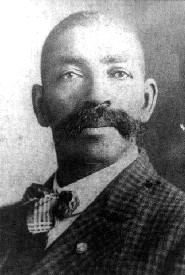Daily Oklahoman, The
Oklahoma City, Oklahoma
February 10, 1933, page 9
 BASS
REEVES DEAD BASS
REEVES DEAD
Muskogee, Okla. Jan 12 (Special) Bass Reeves, the oldest
deputy marshal in the old Indian Territory days, died here
tonight, of consumption. Reeves served during the days of
Judge Parker
at Fort Smith, when men were hung every week. He was in the
government service in Indian Territory for 30 years and is said
to have at least 20 notches on his gun.
Source: http://www.cowboysofcolor.org/index.php?option=com_content&task=view&id=79&Itemid=29
Bass
Reeves, the first black commissioned United States deputy
marshal west of the Mississippi River, was born to slave parents
in July 1824 in Paris, Texas. He escaped to Indian Territory
after severely beating his young master in a dispute over cards
and lived among the "five civilized tribes,"
especially the Creeks, as a fugitive until 1863. Freed by the
Emancipation Proclamation and no longer a fugitive, the
six-foot-two, 190-pound former slave left the Indian country,
bought land near Van Buren, Arkansas, and became a successful
stockman and farmer. Reeves married Nellie Jennie (or Jinney), a
Texas native, in 1864, and they raised a family of ten, five
boys and five girls. After his first wife's death, Reeves
married Winnie Sumter of Muskogee, Oklahoma, in 1900 and started
a second family.
When
Isaac C. Parker was appointed judge for the Federal Western
District Court at Fort Smith, Arkansas, on May 10, 1875, to
bring law to the Indian Territory, one of his first official
acts was to swear in a United States marshal and appoint 200
deputies to curb the lawlessness in the area. White outlaws had
so terrorized the interior groups, especially the Creeks and
Seminoles, that whites, with or without a badge, were unwelcome.
Reeves was recruited because he knew the tribal languages and
country well, and as a black he did not suffer from the
reputation for abuse produced by the activities of the white
criminal element among the Indians.Reeves
had a well-earned reputation for law enforcement south of the
Red River. He killed fourteen men in the performance of his duty
while assigned to the federal district courts at Paris and
Sherman, Texas, during his thirty-two-year career as deputy.
Dependability
and devotion to duty were the benchmarks of Reeves's service to
the government. Many of the district courts asked for Reeves
because of his reliability in serving warrants. Having never
learned to read and write, he had someone to read the subpoenas
or warrants to him until he memorized which name belonged to
each warrant. The deputy's respect for the law was legendary. He
once arrested his own son on a murder warrant after a two-week
manhunt. His son was tried, convicted, and sentenced to life in
prison, but was later given a full pardon.
After
1907 the role and the duties of the United States deputy marshal
as a primary law-enforcement officer were assumed by state
agencies. At the age of eighty-three Reeves accepted a job as
patrolman with the Muskogee city police department, and from
1907 to 1909 there was reportedly never a crime committed on his
beat. In 1909 his health failed, and he died on January 12,
1910, of Bright's disease.
Complied and transcribed by Marti Graham, 2009.
|
 BASS
REEVES DEAD
BASS
REEVES DEAD